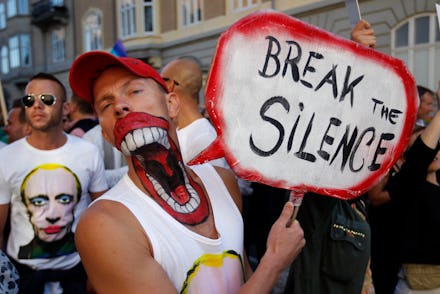When It Comes to Street Harassment, One Group May Have It Worse Than Women

When the majority of people think about street harassment, people assume that women are always on the receiving end. This is certainly a reality that many women face on a day-to-day basis, but LGBT individuals also experience street harassment in astronomical numbers.
The Boston chapter of Hollaback, a nonprofit organization, published a survey in August that revealed that 90% of LGBT-identifying respondents reported experiencing street harassment.
From compiling research to organizing protests, student activists are playing a significant role in shifting the focus towards LGBT folks and approaching the issue in a more intersectional way.
Sarah Scriven, a student at Duke University, helped co-write a guide for Hollaback that explains how different individuals’ identities shape their street harassment experiences. "#HarassmentIs: An exploration of identity and street harassment" was published on the organization’s website earlier this month.
The Feminist Society at New York University also teamed up with Hollaback and co-hosted a chalk walk in Washington Square Park to coincide with the release of the #HarassmentIs guide. Margaret Smiley, a senior at NYU and the group’s co-founder, said she got involved with activism around sexual harassment because of her own experiences.
When she moved to New York City at 18-years-old, Smiley was told the harassment was just a "necessary evil" of living in the Big Apple.
"I was, and am, extremely disturbed by this point of view and don't think it is something we need to simply accept. Sexual harassment impacts everyone differently based on sexuality, race, and age. All are important factors to recognize and address collectively," she explained.
"I think it goes without saying that street harassment largely impacts the LGBT community. Even in areas that are labeled as more LGBT-friendly, communities witness violence against LGBT individuals, and addressing street harassment by understanding the way it effects everyone differently is imperative."
It only makes sense that new generations of college students are shifting the landscape on these issues, considering millennials are more concerned with LGBT rights and intersectional ideas about equality than generations past.
In March, the Pew Research Center found that 70% of millennials support marriage equality and 74% think gay and lesbian individuals should be accepted by society.
Not only are young people more likely to embrace the LGBT community and overarching ideas of equality, but Smiley notes her peers also more accepting of the concept of street harassment from the get-go.
"Honestly, I think there is a huge generation gap on the understanding of street harassment to begin with. The labeling of street harassment as a non-issue makes it extremely difficult to address other issues that stem from that, including intersectionality."